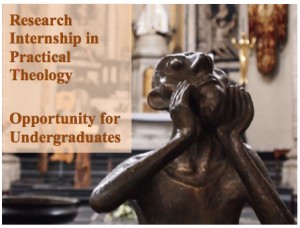 This internship was awarded to Benjamin Grove who successfully completed it in August 2012.
This internship was awarded to Benjamin Grove who successfully completed it in August 2012.
The School of Divinity was pleased to offer a research internship for the summer of 2012, under my supervision, for someone with an interest in practical theology, digital media and pastoral care.
The theme of the internship was ‘Narratives, Theology and Pastoral Care’ and was advertised in these terms:
- Do you want to develop your research skills over the summer?
- Are you keen to enhance your CV by demonstrating that you can successfully complete a research project under academic supervision?
- Are you interested in learning how to deploy critical thinking in digital environments?
It was possible thanks to a grant awarded by the Strategic Enhancement of Learning Fund (SELF), Centre for Academic, Professional & Organisational Development (CAPOD), University of St Andrews.
Details
The module ‘Theology and Pastoral Care’ includes lectures on pastoral care theories as well as occasional visits from practitioners such as chaplains, medical doctors, clergy and counsellors. The learning experience of students will be greatly enhanced if they can also hear about the experience of various forms of need that might be addressed by pastoral care.
The aim of the project was to identify recorded interviews that are available online and that could be made available for use in the classroom and by students for background research.
The outcome from the research internship was a list (in the forms of urls) of online interviews or testimonies from people telling about their experiences of one or more of the following categories:
- the ‘Third Age’ (people over 70)
- disability
- health
- grief, death and dying
- sexuality
- counselling
- depression and mental illness
- toxic spirituality
Each item on the list was annotated with a brief description of the piece, its copyright status and an evaluative comment from you explaining why you have selected this file.
The skills the intern was to develop on this internship included:
- critical evaluation of online resources,
- a deepened understanding of the human context of pastoral care, and
- advanced online searching.
The student was also to become more aware of copyright issues and of working independently under supervision on an academic research project.
A short essay, reflecting on what the intern learned during the internship (1, 500 words) had to delivered along with the project content.